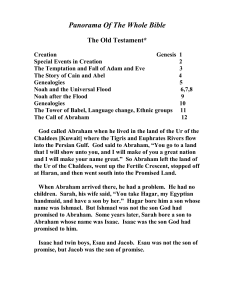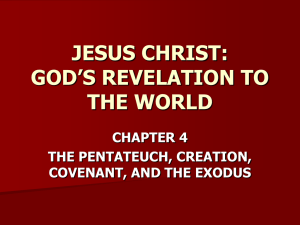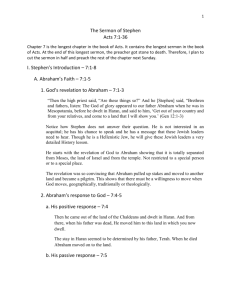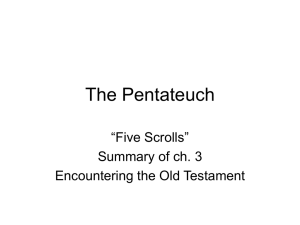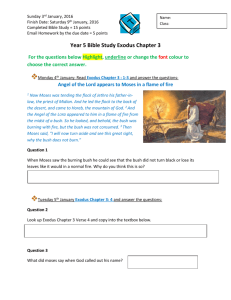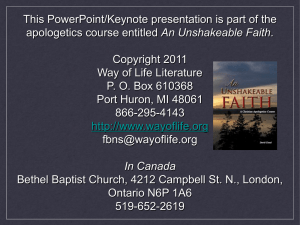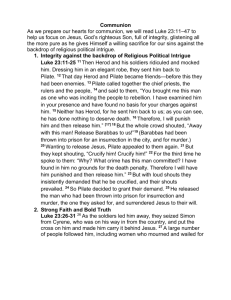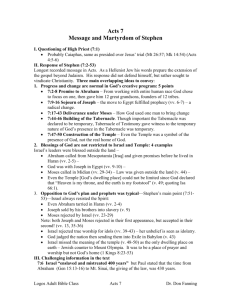The Sermon of Stephen Part 1
advertisement
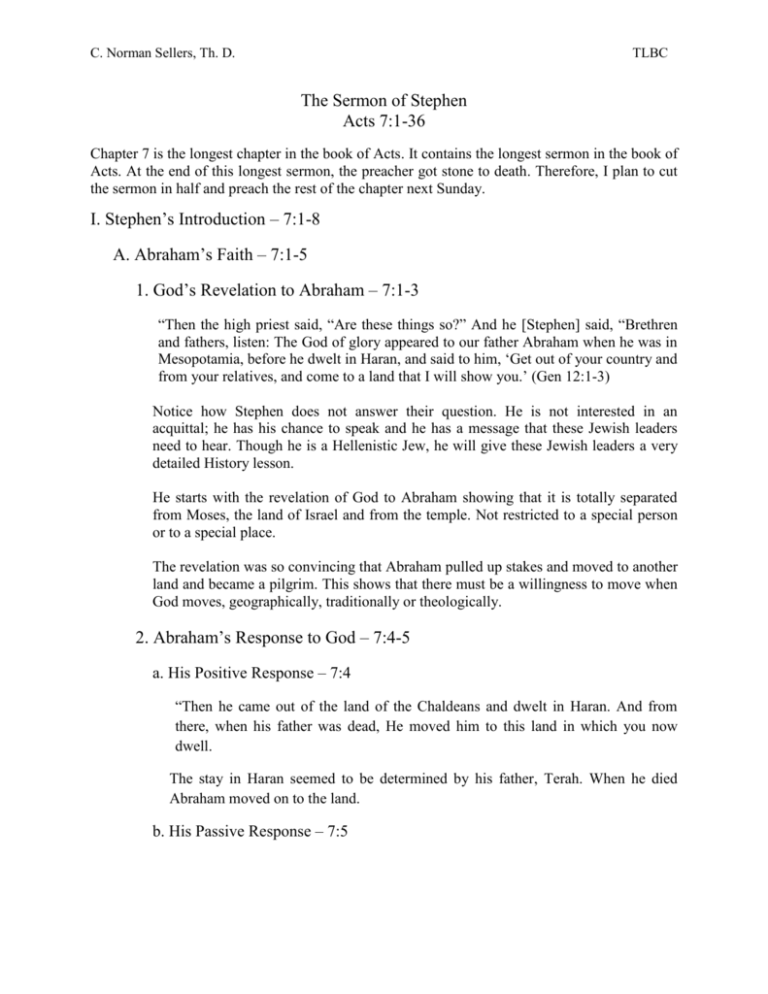
C. Norman Sellers, Th. D. TLBC The Sermon of Stephen Acts 7:1-36 Chapter 7 is the longest chapter in the book of Acts. It contains the longest sermon in the book of Acts. At the end of this longest sermon, the preacher got stone to death. Therefore, I plan to cut the sermon in half and preach the rest of the chapter next Sunday. I. Stephen’s Introduction – 7:1-8 A. Abraham’s Faith – 7:1-5 1. God’s Revelation to Abraham – 7:1-3 “Then the high priest said, “Are these things so?” And he [Stephen] said, “Brethren and fathers, listen: The God of glory appeared to our father Abraham when he was in Mesopotamia, before he dwelt in Haran, and said to him, ‘Get out of your country and from your relatives, and come to a land that I will show you.’ (Gen 12:1-3) Notice how Stephen does not answer their question. He is not interested in an acquittal; he has his chance to speak and he has a message that these Jewish leaders need to hear. Though he is a Hellenistic Jew, he will give these Jewish leaders a very detailed History lesson. He starts with the revelation of God to Abraham showing that it is totally separated from Moses, the land of Israel and from the temple. Not restricted to a special person or to a special place. The revelation was so convincing that Abraham pulled up stakes and moved to another land and became a pilgrim. This shows that there must be a willingness to move when God moves, geographically, traditionally or theologically. 2. Abraham’s Response to God – 7:4-5 a. His Positive Response – 7:4 “Then he came out of the land of the Chaldeans and dwelt in Haran. And from there, when his father was dead, He moved him to this land in which you now dwell. The stay in Haran seemed to be determined by his father, Terah. When he died Abraham moved on to the land. b. His Passive Response – 7:5 C. Norman Sellers, Th. D. TLBC “And God gave him no inheritance in it, not even enough to set his foot on. But even when Abraham had no child, He promised to give it to him for a possession and to his descendants after him. Stephen is playing the same theme: God’s promise to Abraham was spiritual in nature. The promise included the physical land, but not right now, later. He was to have God as his possession. Later, his descendants would possess the land, but even that is a temporary possession. They looked for a city “whose builder and maker is God.” Heb 11:10; 12:22; 13:14. That city would be on the earth when God became their King. B. Abraham’s Future – 7:6-8 1. The Government of God – 7:6-7 a. God’s Omniscience – 7:6 “But God spoke in this way: that his descendants would dwell in a foreign land, [Egypt] and that they would bring them into bondage and oppress them four hundred years. Abraham’s new God had everything planned out. He knew all of the events and all of the players in these events. But it is one thing to know them and another to be able to control them. He is that as well. b. God’s Omnipotence – 7:7 ‘And the nation to whom they will be in bondage I will judge,’ said God, ‘and after that they shall come out and serve Me in this place.” 2. The Grace of God – 7:8 a. God’s Covenant conveyed to the Pilgrim – 7:8a “Then He gave him the covenant of circumcision; It was a sign of the covenant: Abraham belonged to God and God was not ashamed to be called his God.” b. God’s covenant Confirmed to the Patriarchs – 7:8b “and so Abraham begot Isaac and circumcised him on the eighth day; and Isaac begot Jacob, and Jacob begot the twelve patriarchs.” Abraham passed the sign of the covenant on to his son, Isaac and they in faith passed it on to their sons. God also confirmed the covenant even after a time of failure. [so, failure in their lives did not annul the covenant]. C. Norman Sellers, Th. D. TLBC II. Stephen’s Exhortation – 7:9-50 A. How Israel Treated their Saviors – 7:9-36 Stephen points out two outstanding Saviors – Deliverers - of Israel, Joseph and Moses. These two men could be called O.T. pictures of Jesus. They were sent by God to deliver Israel. They were rejected by Israel. (Joseph was sold for twenty pieces of silver) They went away for a while. Then they came back and delivered Israel. Jesus had been sent by God to deliver Israel. He was rejected by Israel (twenty pieces of silver) He has gone away – the resurrection and ascension. He will come back and deliver Israel. 1. Their Rejection of Joseph – Who Settled them in Egypt – 7:9-16 a. How Joseph was Resented – 7:9 “And the patriarchs, becoming envious, sold Joseph into Egypt. But God was with him. Joseph’s Dreams: (Gen 37) Their sheaves bowed down to his sheaf. The sun, moon and eleven stars bowed down to him. Joseph’s coat of many colors, His dreams got him into trouble; His dreams got him out of trouble. b. How Joseph was Raised up – 7:10 “ and delivered him out of all his troubles, and gave him favor and wisdom in the presence of Pharaoh, king of Egypt; and he made him governor over Egypt and all his house. The baker, the butler and then Pharaoh all had dreams. c. How Joseph was Revealed – 7:11-16 (1) The famine that brought them to Joseph – 7:11-12 “Now a famine and great trouble came over all the land of Egypt and Canaan, and our fathers found no sustenance. But when Jacob heard that there was grain in Egypt, he sent out our fathers first.” (2) The forgiveness that bound them to Joseph – 7:13-14 C. Norman Sellers, Th. D. TLBC (a) His kindness declared – 7:13 “And the second time Joseph was made known to his brothers, and Joseph’s family became known to the Pharaoh. You meant it for evil / God meant it for good. (Randy Alcorn calls this the 50/20 verse.) (b) His kindness demonstrated – 7:14 “Then Joseph sent and called his father Jacob and all his relatives to him, seventy-five people.” (3) The faith that blessed them in Joseph – 7:15-16 “So Jacob went down to Egypt; and he died, he and our fathers. And they were carried back to Shechem and laid in the tomb that Abraham bought for a sum of money from the sons of Hamor, the father of Shechem.” 2. Their Reaction to Moses – Who Saved them from Egypt – 7:17-36 a. The Fearful Bondage of Israel – 7:17-19 (1) The time – 7:17a “But when the time of the promise drew near which God had sworn to Abraham, (2) The tension – 7:17b-18 “the people grew and multiplied in Egypt till another king arose who did not know Joseph. (3) The terror – 7:19 “This man dealt treacherously with our people, and oppressed our forefathers, making them expose their babies, so that they might not live. All of the male children were not allowed to live, in order to stop the rapid increase of the Israelites.” b. The Foolish Bigotry – 7:20-28 (1) The savior’s [Moses] birth – 7:20 “At this time Moses was born, and was well pleasing to God; and he was brought up in his father’s house for three months.” C. Norman Sellers, Th. D. TLBC He was put in a little floating crib and placed in the Nile. She did as Pharaoh had commanded, She put Moses in the river. Miriam told her that she would take the baby and find a nurse for it. His own mother nurse him for 3 months. (2) The savior’s background – 7:21-22 “But when he was set out, Pharaoh’s daughter took him away and brought him up as her own son. And Moses was learned in all the wisdom of the Egyptians, and was mighty in words and deeds. (3) The savior’s brethren – 7:23-28 (a) The manifestations of Moses – 7:23-25 “Now when he was forty years old, it came into his heart to visit his brethren, the children of Israel. And seeing one of them suffer wrong, he defended and avenged him who was oppressed, and struck down the Egyptian. For he supposed that his brethren would have understood that God would deliver them by his hand, but they did not understand.” (b) The mediation of Moses – 26 “And the next day he appeared to two of them as they were fighting, and tried to reconcile them, saying, ‘Men, you are brethren; why do you wrong one another?” (c) The misinterpretation of Moses – 7:27-28 “But he who did his neighbor wrong pushed him away, saying, ‘Who made you a ruler and a judge over us? Do you want to kill me as you did the Egyptian yesterday?’ c. The Further Burdens of Israel – 7:27-34 (1) While Moses was learning – 7:29 “Then, at this saying, Moses fled and became a dweller in the land of Midian, where he had two sons.” (2) While Moses was looking – 7:30-31 “And when forty years had passed, an Angel of the Lord appeared to him in a flame of fire in a bush, in the wilderness of Mount Sinai. When Moses saw it, he marveled at the sight; and as he drew near to observe, the voice of the Lord came to him,” C. Norman Sellers, Th. D. TLBC (3) While Moses was listening – 7:32-34 (a) To a living God – 7:32-33 “ saying, ‘I am the God of your fathers—the God of Abraham, the God of Isaac, and the God of Jacob.’ And Moses trembled and dared not look. ‘Then the LORD said to him, “Take your sandals off your feet, for the place where you stand is holy ground.” (b) To a loving God – 7:34 “I have surely seen the oppression of My people who are in Egypt; I have heard their groaning and have come down to deliver them. And now come, I will send you to Egypt.” (4) The fatal blindness of Israel – 7:35-36 (a) Moses had been sent to save them – 7:35 “This Moses whom they rejected, saying, ‘Who made you a ruler and a judge?’ is the one God sent to be a ruler and a deliverer by the hand of the Angel who appeared to him in the bush. (b) Moses had been sent to separate them – 7:36 “He brought them out, after he had shown wonders and signs in the land of Egypt, and in the Red Sea, and in the wilderness forty years.” Stephen covered a long period of time in this verse.

